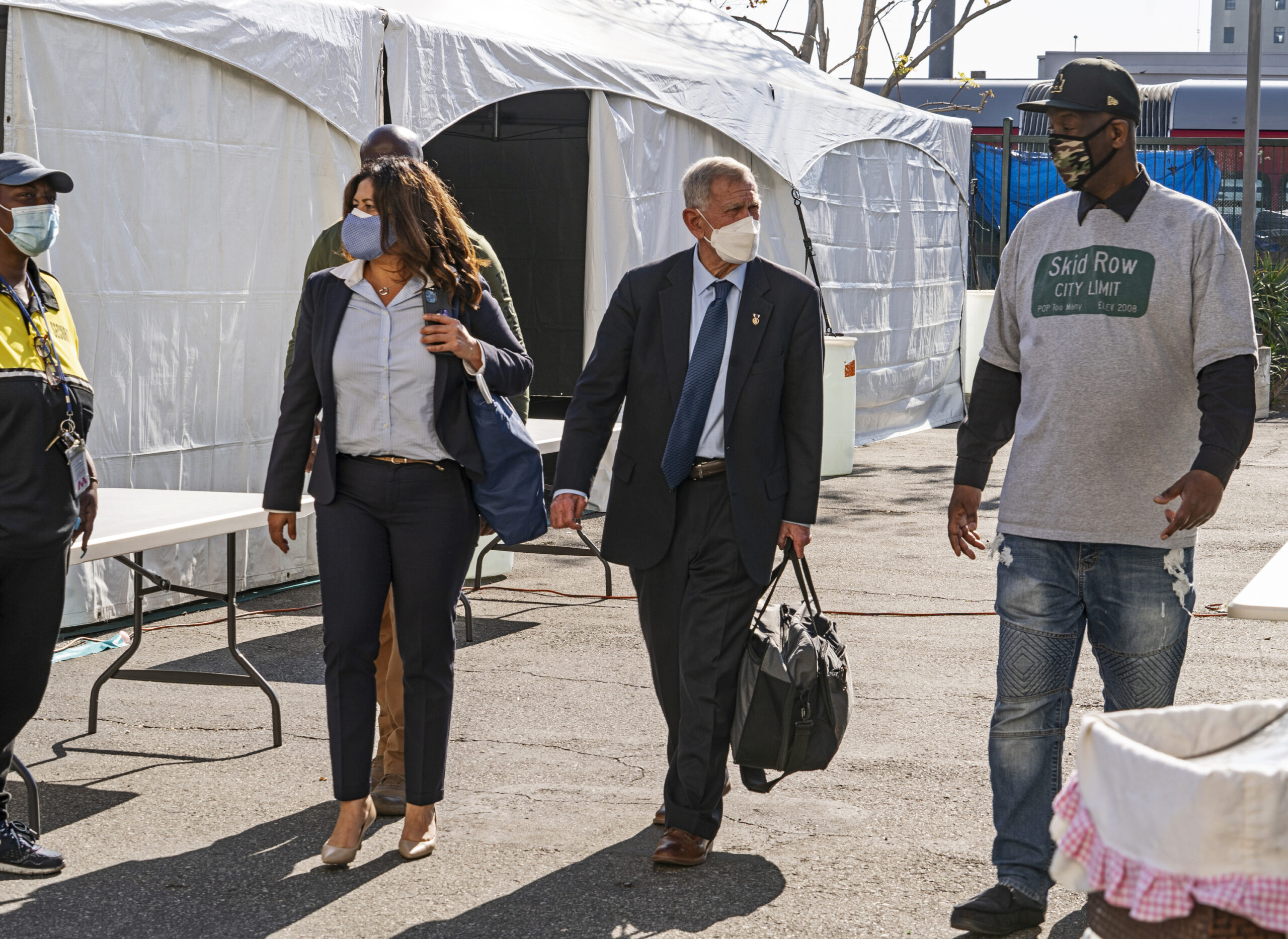LOS ANGELES — Racism, corruption, and inaction by Los Angeles city and county officials have caused a massive homeless problem, and intervention by the courts is the only way to ensure that people are provided with shelter, a U.S. District Court judge has ruled.
Judge David Carter issued a withering 109-page order Tuesday, accusing Los Angeles bureaucrats of raking in billions of tax dollars without any real results to stem the tide of homelessness that increases by double digits each year. The judge has now taken control of the city’s and county’s homeless abatement efforts and ordered housing for the entire Skid Row population of 4,600 by October.
LONG BEACH AND LA COUNTIES TO HOUSE 3,500 MIGRANT CHILDREN
“For decades in Los Angeles, the desperation of its citizens has been met with a yawn. Each day, newspaper headlines bring forth different cities and communities calling for action. Meanwhile, politicians measure success by how much money they have raised to combat homelessness,” Carter wrote. “Bureaucrats create statistics trumpeting their efficiency and success to the public. But none of this has led to accountability or solutions. Los Angeles is indisputably facing a homelessness crisis that merits immediate, emergency action.”
Carter also accused Los Angeles of violating the U.S. Constitution clauses of equal protection and due process, in addition to creating a “state danger” that violated California law requiring “protection, care and assistance to the people of the state … by providing appropriate aid and services to all of its needy and distressed.”
The order came after a lawsuit was filed against the city and county last year by the LA Alliance for Human Rights, a homeless advocacy group seeking to provide an enforceable mandate to shelter the county’s homeless. At last count, Los Angeles had 66,436 homeless, a 20,000 increase over the past five years. California has one-fifth of the nation’s homeless population, with 151,278 people, according to 2021 statistics by World Population Review.

After a dozen hearings, including one instance in which Carter held court in a Skid Row parking lot, the LA Alliance grew tired of delays and empty promises. The organization filed an injunction asking Carter to force the defendants into complying with a housing mandate, said plaintiff attorney Matthew Umhofer.
“The dysfunction of the city and county on the issue of homeless is epic,” Umhofer told the Washington Examiner. “They have had decades to solve this problem, and you have leaders … embracing the problem and wanting to fix it, and they never do. It gets worse every year.”
Democratic Mayor Eric Garcetti criticized Carter’s involvement in a news conference Tuesday.
“[To] a court that decides to get in the way, I say, ‘Stay out of our way,’” Garcetti remarked. “Roadblocks masquerading as progress are the last things we need. We cannot have anything slow down 89 projects … I don’t want to wait one day.”
Umhofer called Garcetti’s comments “the height of arrogance.”
“For Garcetti to tell this judge to stay out of the way when Garcetti has been in the way for a decade on this issue, saying all the right things and doing the wrong things while people die on the streets, is unconscionable,” Umhofer said.
Carter gave Garcetti “every opportunity” to fix the problem and spent a year making phone calls, talking to government officials, and walking the streets of Skid Row, but politicians couldn’t “put old conflicts to the side and work on this. There is a ton of finger-pointing,” Umhofer said.
Skid Row, located in downtown Los Angeles, was born in 1910 when the city built a shantytown to house migrants. Over the ensuing century, the government engaged in a variety of racist endeavors such as redlining, selective freeway construction, eminent domain, and loan discrimination that resulted in a large minority homeless population, Carter wrote.
With the shantytown long gone, the homeless piled onto the streets of a Skid Row that was forcibly contained to 50 square blocks. The population exploded during the past 20 years as the California Legislature whittled away the judicial system that decriminalized drug and property crimes and removed a requirement that mental health and drug-addicted defendants obtain treatment.
Four years ago, Los Angeles voters passed Proposition HHH, a $1.2 billion bond to fund homeless 10,000 housing projects in 10 years. The first project opened last year with just 62 housing units, Carter wrote.
“At the current rate, it will take nearly 30 years to build enough housing for over 66,000 people currently experiencing homelessness—an estimate that doesn’t even account for the fact that the homelessness rate is growing exponentially every year,” Carter wrote. “Moreover, while the average cost of a custom home in L.A. starts at $350,000, more than 28% of Proposition HHH units in construction exceed $600,000 per unit.”
Corruption related to inflated contracts and cronyism was rampant and even brought down Jose Huizar, a city councilman, last year following a three-year FBI investigation, Carter detailed in the order.
Los Angeles also underutilized a state and federally funded COVID-19 measure called Project Roomkey, which would have paid for 15,000 motel rooms to house the homeless. Instead, only 4,177 rooms were used, and hundreds of homeless died on the streets, Carter wrote. “From mishandling Project Roomkey to sinking $1.2 billion into the ever-delinquent Proposition HHH, Los Angeles has documented a long history of plans or budgets that have fallen short, year after year, as the homelessness crisis worsens,” Carter wrote.
“These cases, of which there are almost certainly more to be discovered, indicate that the city has turned a blind eye to corruption as money is being siphoned off from funds that taxpayers voted to allocate to the homeless population,” Carter wrote.
CLICK HERE TO READ MORE FROM THE WASHINGTON EXAMINER
As a result, he ruled, the court does not believe that the city will meet the homeless crisis or overcome “decades of intentional racism and deliberate indifference.”
